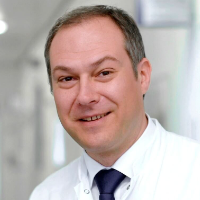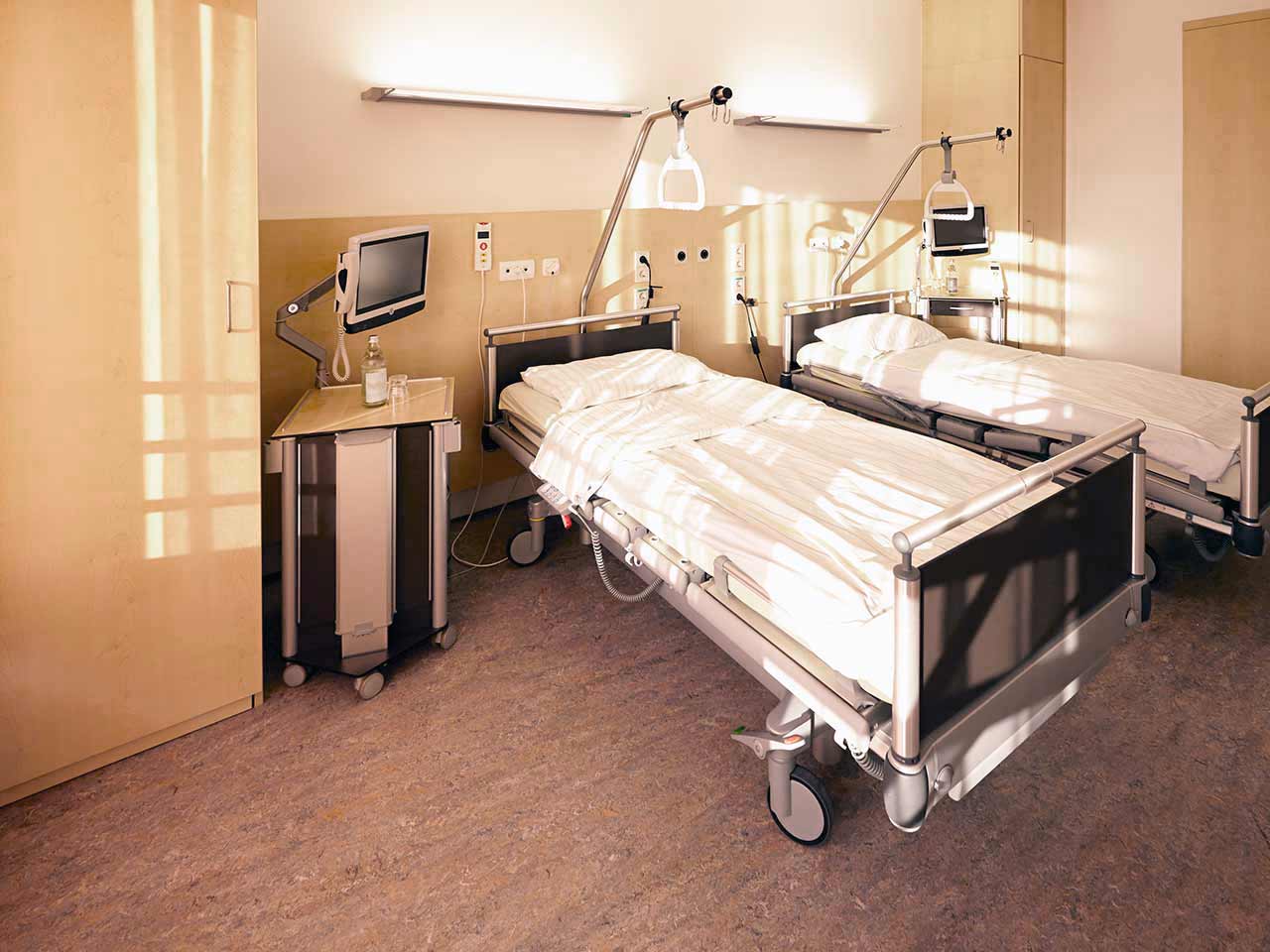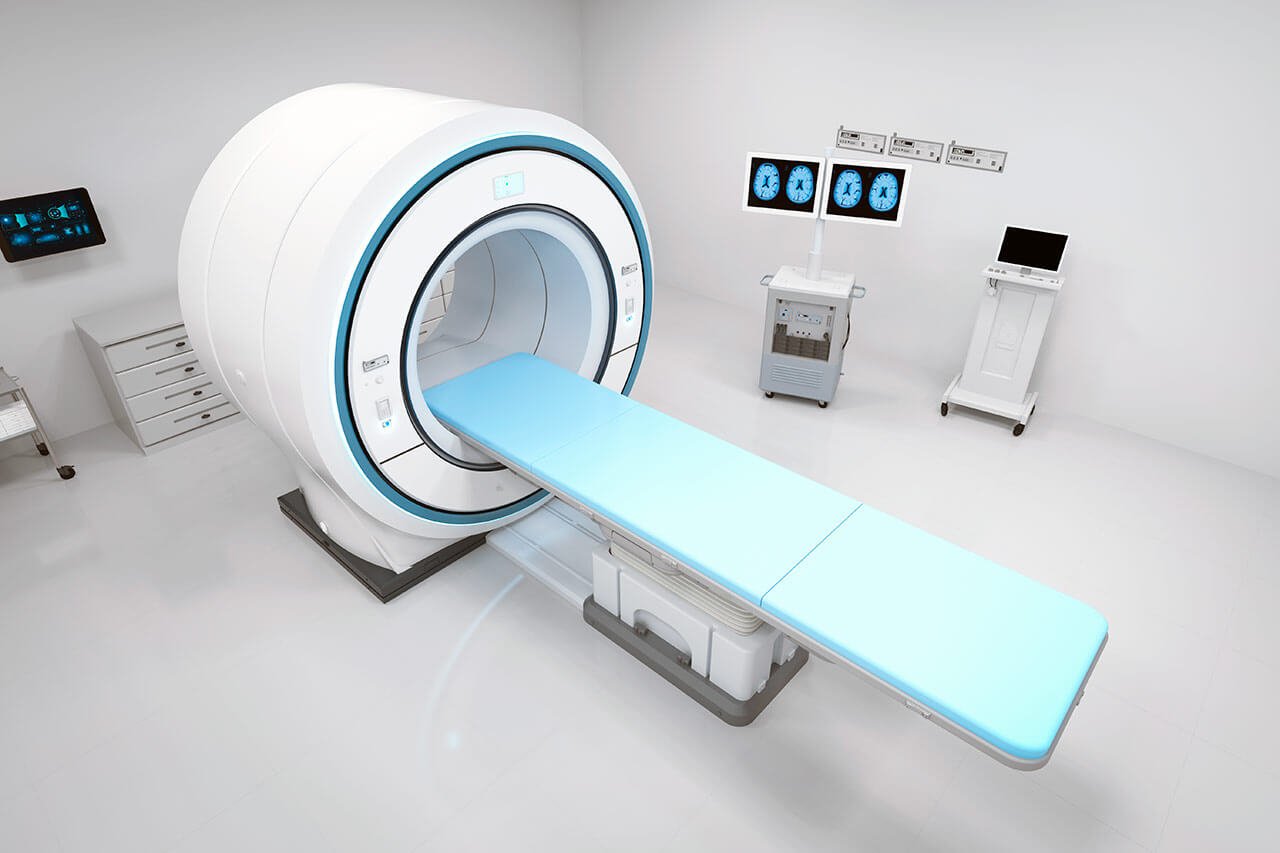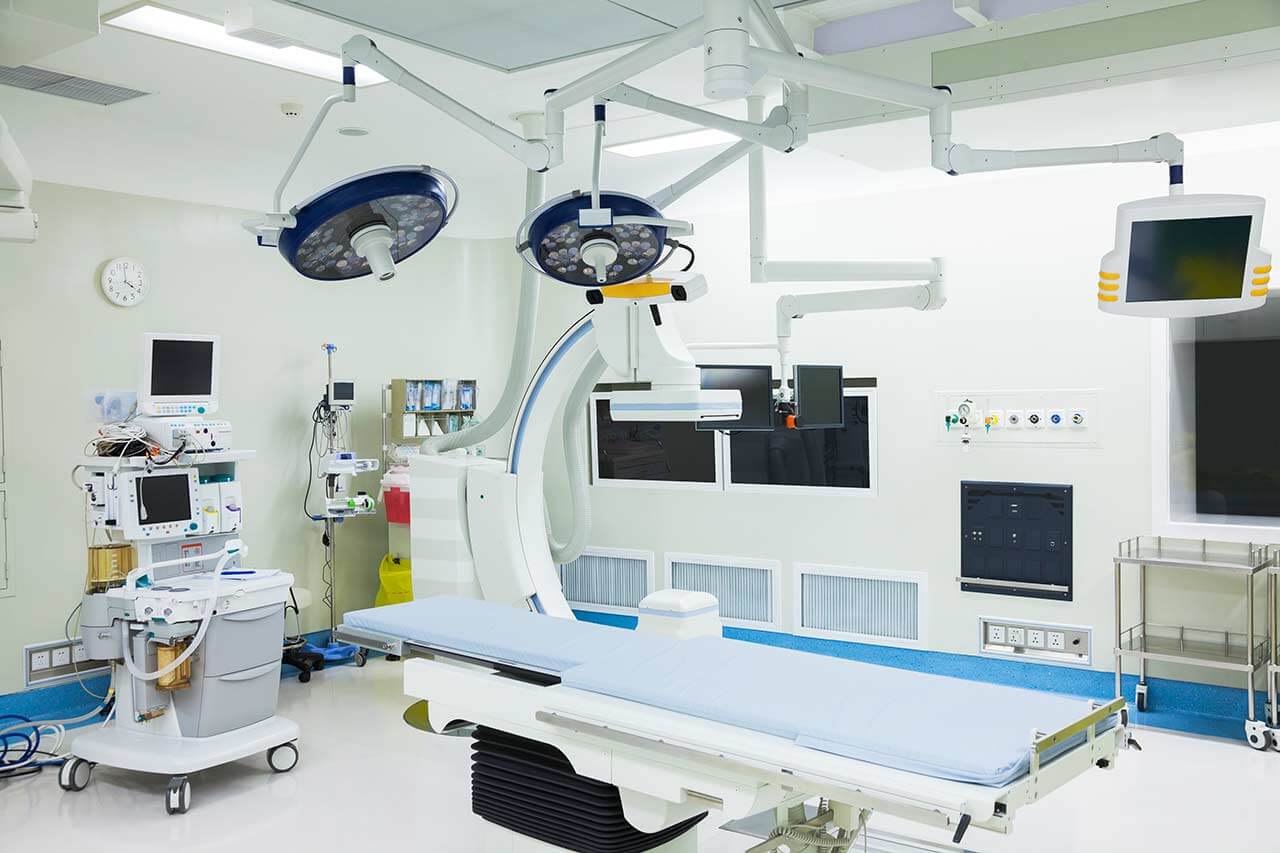
The program includes:
- Initial presentation in the clinic
- case history collection
- general clinical examination
- laboratory tests:
- complete blood count
- general urine analysis
- biochemical analysis of blood
- TSH-basal, fT3, fT4
- tumor markers (thyroglobulin (Tg),
Tg Antibody (TgAb)) - indicators of inflammation
- indicators blood coagulation
- thyroid ultrasound
- CT/MRI scanners of the neck
- thyroid scintigraphy
- biopsy and histological examination
- preoperative care
- thyroid resection with cervical lymph nodes excision
- symptomatic treatment
- cost of essential medicines
- nursing services
- stay in the hospital with full board (up to 6 days)
- full hospital accommodation
- elaboration further recommendations
Required documents
- Medical records
- MRI/CT scan (not older than 3 months)
- Biopsy results (if available)
Service
You may also book:
 BookingHealth Price from:
BookingHealth Price from:
About the department
The Department of General and Abdominal Surgery, Endocrine Surgery, Hernia Surgery, Hepatopancreatobiliary Surgery, Colorectal Surgery and Bariatric Surgery at the ViDia Hospital Karlsruhe offers the widest range of modern surgical interventions in the areas of its specialization. Patients with stomach, colon, esophageal, pancreatic, liver, gallbladder, bile duct, and rectal diseases are operated on here. The department has unique experience in providing medical care to patients with pathologies of the thyroid gland, parathyroid glands, and adrenal glands. Hernia repair surgery for all types of hernias and bariatric interventions for morbid obesity are also performed here. A source of the department's pride are three modern operating rooms, which were put into operation in 2011. The operating rooms are equipped with state-of-the-art technology and adapted for minimally invasive laparoscopic interventions. The department has been certified by the German Cancer Society (DKG) in colon cancer treatment since 2011, and the department has received the same certification in pancreatic cancer treatment since 2020. It is worth noting that the department is part of the hospital's Cancer Center certified by the German Cancer Society (DKG), which provides patients with comprehensive cancer treatment with the participation of specialists from all related medical fields. The department's surgeons successfully perform cytoreductive interventions followed by hyperthermic intraperitoneal chemotherapy (HIPEC). This treatment is not offered in every hospital because it requires special training and long experience from doctors. The health of patients is in the safe hands of a highly qualified team of 18 surgeons and more than 70 medical staff members. The Head Physician of the department is Prof. Dr. med. Oliver Drognitz.
The department's key area of specialization is the surgical treatment of malignant gastrointestinal diseases. The specialists at the medical facility have a perfect command of minimally invasive surgical techniques, so they strive to perform resections of malignant tumors using these methods whenever possible. The department regularly performs laparoscopic surgical procedures for stomach cancer, colon cancer, rectal cancer, liver cancer, and other malignant diseases. During such interventions, a surgical approach is provided through small skin and soft tissue incisions 3-11 mm in length. Trocars (a special surgical instrument resembling a thin tube) and a miniature video camera are inserted through the incisions, with the help of which the images of the operating field are transmitted to a large screen at multiple zooms in real time. When performing the intervention, the doctor inserts thin, long surgical instruments into the abdominal cavity and performs the necessary surgical manipulations, guided by the images of the operating field on the screen. The result of minimally invasive surgery is comparable to classical open surgery. However, patients recover faster after such operations, the risk of postoperative complications is minimal, and excellent aesthetic results are provided.
The department offers an innovative treatment for peritoneal carcinomatosis: cytoreductive surgery combined with hyperthermic intraperitoneal chemotherapy (HIPEC). This type of treatment is the only effective method that allows patients with peritoneal carcinomatosis to increase their life expectancy and improve their quality of life. The procedures of cytoreductive surgery and HIPEC begin with the surgical removal of visible tumors from the abdominal cavity. After completing the surgery, doctors rinse the patient's abdomen with a chemotherapy solution heated to 42-43°C through the previously placed drainage systems under the same anesthesia. This stage of the therapeutic procedure is called hyperthermic intraperitoneal chemotherapy. It is aimed at destroying the microscopic remnants of the tumor. Depending on the chemotherapy drugs used, the duration of the HIPEC procedure may last 30-120 minutes. This treatment is performed once. Cytoreductive surgery combined with HIPEC is performed in the department for such types of cancers as colorectal cancer, rectal cancer, peritoneal pseudomyxoma, appendix cancer, stomach cancer, peritoneal mesothelioma, sarcomatosis, etc.
The department's surgeons regularly operate on patients with various types of hernias, such as inguinal, umbilical, diaphragmatic, and incisional, as well as anterior abdominal wall hernias and parastomal hernias. The department's surgeons perform hernia repairs using both classic open and minimally invasive techniques. Minimally invasive surgery, such as transabdominal preperitoneal hernia repair (TAPP), IPOM mesh implantation, and other techniques, is preferred when clinically indicated. The main advantages of minimally invasive hernia repair surgery are less severe postoperative pain and a short recovery period. It is worth noting that when performing laparoscopic hernioplasty, the hospital stay is only one day. In most cases, hernia repair surgery is performed under general anesthesia, but surgeons can also use local anesthesia whenever possible.
The department's team of hepatopancreatobiliary surgeons specializes in the surgical treatment of diseases of the pancreas, liver, gallbladder, and bile ducts. In 2020, the department received quality certification in pancreatic surgery from the German Cancer Society (DKG). The specialists operate on patients with pancreatic cancer, including neuroendocrine tumors, chronic pancreatitis, and pancreatic cysts. A large number of surgical interventions on the pancreas are performed using minimally invasive techniques, which reduces risks to the patient’s health and can significantly shorten the duration of the hospital stay.
Colorectal surgery plays an important role in the department's clinical activity. Surgeons admit patients with rectal and anal pathologies, the most common among which are hemorrhoids, thrombosed hemorrhoids, perianal abscesses, perianal fistulas, anal fissures, rectocele, fecal incontinence, benign tumors, and malignant neoplasms. Surgical procedures for these conditions are almost always performed using minimally traumatic surgical techniques without extensive skin and soft tissue incisions.
The department's key clinical focuses include:
- General and abdominal surgery
- Surgery for benign diseases
- Appendectomy (surgery to remove appendicitis)
- Cholecystectomy (surgery to remove the gallbladder)
- Splenectomy (surgery to remove the spleen)
- Surgery for diverticular disease
- Surgery for inflammatory bowel diseases: Crohn's disease and ulcerative colitis
- Surgery for gastroesophageal reflux disease
- Surgery for achalasia cardia
- Surgery for Zenker's diverticulum
- Surgery for malignant diseases
- Surgery for stomach cancer
- Surgery for colon cancer
- Surgery for esophageal cancer
- Cytoreductive surgery combined with hyperthermic intraperitoneal chemotherapy (HIPEC) for peritoneal carcinomatosis
- Surgery for benign diseases
- Hernia surgery
- Surgery for inguinal hernias
- Surgery for umbilical hernias
- Surgery for anterior abdominal wall hernias
- Surgery for incisional hernias
- Surgery for parastomal hernias
- Surgery for diaphragmatic hernias
- Hepatopancreatobiliary surgery
- Surgery for pancreatic diseases
- Surgery for benign pancreatic diseases: chronic pancreatitis and pancreatic cysts
- Surgery for malignant pancreatic diseases: pancreatic cancer and neuroendocrine tumors
- Surgery for liver cancer and liver metastases
- Surgery for gallbladder cancer and bile duct cancer
- Surgery for pancreatic diseases
- Colorectal surgery
- Surgery for hemorrhoids
- Surgery for thrombosed hemorrhoids
- Surgery for perianal abscesses and fistulas
- Surgery for anal fissures
- Surgery for pilonidal sinus
- Surgery for rectocele
- Surgery for rectal prolapse
- Surgery for fecal incontinence
- Surgery for benign and malignant rectal and anal tumors
- Endocrine surgery
- Surgery for thyroid cancer and benign thyroid diseases (for example, goiter)
- Surgery for parathyroid diseases: hyperparathyroidism
- Surgery for benign and malignant adrenal tumors
- Bariatric surgery
- Endoscopic intragastric balloon implantation
- Gastric banding
- Sleeve gastrectomy
- Roux-Y gastric bypass
- Mini-gastric bypass
- Biliopancreatic diversion with a duodenal switch
- Other surgical options
Curriculum vitae
Higher Education and Postgraduate Training
- 1990 - 1997 Medical studies, Faculty of Medicine, University of Luebeck.
- 09.1995 United States Medical Licensing Exam (USMLE), stage 1.
- 08.1996 United States Medical Licensing Exam (USMLE), stage 2.
- 08.1997 Examination of the Educational Commission for Foreign Medical Graduates (ECFMG).
- 09.1998 Thesis defense, Faculty of Medicine, University of Luebeck. Subject: "Characterization of released vancomycin and teicoplanin from sponge-resorbable glycerol gelatin foam: experimental studies of possible local therapy with glycopeptide antibiotics".
- Habilitation in Surgery, Faculty of Medicine, Albert Ludwig University of Freiburg. Subject: "Pathophysiology of ischemia/reperfusion after pancreas transplantation with special focus on microcirculation, apoptosis, and gene expression".
- 04.2010 Extraordinary Professorship for Surgery, Faculty of Medicine, Albert Ludwig University of Freiburg.
Professional Career
- 07.1997 - 12.1998 Internship, Department of General, Vascular, Thoracic and Transplant Surgery, University Hospital Rostock.
- 01.1999 - 08.2001 Research Fellow, Department of General, Abdominal, Thoracic and Transplant Surgery, University Hospital Rostock.
- 09.2001 - 04.2005 Research Fellow, Department of General and Abdominal Surgery, University Hospital Freiburg.
- 04.2005 Head Physician, Department of General and Abdominal Surgery, University Hospital Freiburg.
- 11.2008 Head Physician, Department of Hepatobiliary Surgery, University Hospital Freiburg.
- Since 03.2009 Head Physician, Center for Hepatobiliary Surgery, University Hospital Freiburg.
- Since 05.2010 Head Physician of the Interdisciplinary Surgical Tumor Board "Hepatocellular carcinoma", University Hospital Freiburg.
- 10.2011 Head Physician, Interdisciplinary Center for Intestinal Surgery, University Hospital Freiburg.
- 04.2013 Head Physician, Department of General and Abdominal Surgery, Endocrine Surgery, Hernia Surgery, Hepatopancreatobiliary Surgery, Colorectal Surgery and Bariatric Surgery, ViDia Hospital Karlsruhe.
Certification and Additional Qualifications
- 09.2003 Certification in Surgery, Medical Association of South Baden.
- 04.2009 Certification in Abdominal Surgery, Medical Association of South Baden.
- 04.2009 Additional qualification in Intensive Care, Medical Association of South Baden.
Photo of the doctor: (c) ViDia Kliniken Karlsruhe
About hospital
The ViDia Hospital Karlsruhe is a modern medical facility with a rich history and traditions. The medical complex is an academic hospital of the University of Freiburg, granting patients access to advanced university medicine and the very latest therapeutic developments. The hospital first opened its doors in 1851 and, since then, has maintained a leading position in the European medical arena. The health facility offers a state-of-the-art technical base, comfortable infrastructure, and highly qualified doctors. All this allows the hospital to provide patients with top-class healthcare in accordance with modern standards. In addition, the hospital's team honors Christian traditions, emphasizing a humane attitude towards the patient and striving to provide understanding and support.
The hospital employs a large team of specialists, consisting of over 3,200 staff members, including 400 highly qualified physicians. The medical team admits more than 50,000 inpatients every year, and about 100,000 patients are diagnosed and treated on an outpatient basis or in a day hospital. More than 3,000 babies are born in the maternity rooms of the Department of Obstetrics every year. More and more patients, including those from abroad, come to the hospital for medical care annually.
The hospital has 24 specialized departments with 25 highly certified, narrowly focused centers integrated into them. A large Cancer Center certified according to the German Cancer Society (DKG) standards also operates here. Thus, one of the main clinical focuses of the medical complex is cancer treatment. The hospital also excels in other specialties, such as general surgery, abdominal surgery, thoracic surgery, orthopedics, cardiology, endocrinology, otolaryngology, pulmonology, gastroenterology, and others. There are 37 operating rooms available here for surgical treatment, the equipment of which corresponds to the highest technical level. Priority is given to performing minimally traumatic operations using minimally invasive, endoscopic, arthroscopic, and endovascular techniques.
The ViDia Hospital Karlsruhe enjoys a high reputation in Germany and far beyond its borders. The health facility successfully combines innovative medicine with Christian values, thanks to which the patient receives not only effective treatment but also care, understanding, and support.
Photo: (с) depositphotos
Accommodation in hospital
Patients rooms
The patients of the ViDia Hospital Karlsruhe stay in comfortable single and double rooms with modern design. Each patient room has an ensuite bathroom with a shower and a toilet. The standard room furnishings include an automatically adjustable bed, a bedside table, a table and chairs, a wardrobe, a telephone, a TV, and a radio. Wi-Fi access is also available in the patient rooms.
Patients can also be accommodated in enhanced comfort rooms. These rooms are very spacious and are additionally equipped with a safe, a mini-fridge, and upholstered furniture.
Meals and Menus
The patients of the hospital are offered three tasty meals a day: breakfast is served buffet-style, and there are several set menus to choose from for lunch and dinner.
If, for some reason, you do not eat all of the foods, you will be offered an individual menu. Please inform the medical staff about your dietary preferences prior to treatment.
Further details
Standard rooms include:
![]() Toilet
Toilet
![]() Shower
Shower
![]() Wi-Fi
Wi-Fi
![]() TV
TV
Religion
There are several chapels on the territory of the hospital. Regular Catholic and evangelical services are held here. Patients can also visit one of the chapels at any time to find a quiet place to pray, if desired.
Accompanying person
Your accompanying person may stay with you in your patient room or at the hotel of your choice during the inpatient program.
Hotel
You may stay at the hotel of your choice during the outpatient program. Our managers will support you for selecting the best option.





